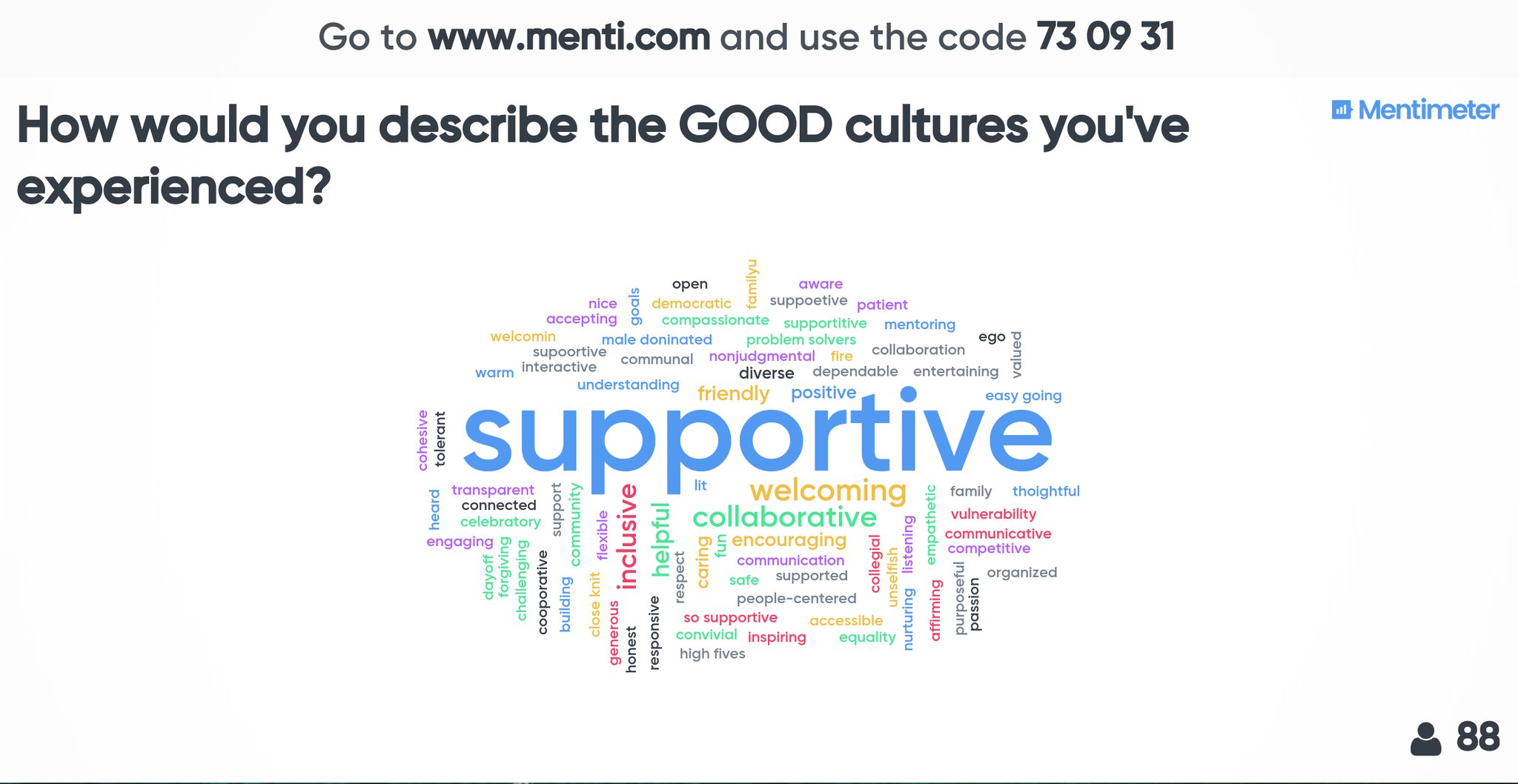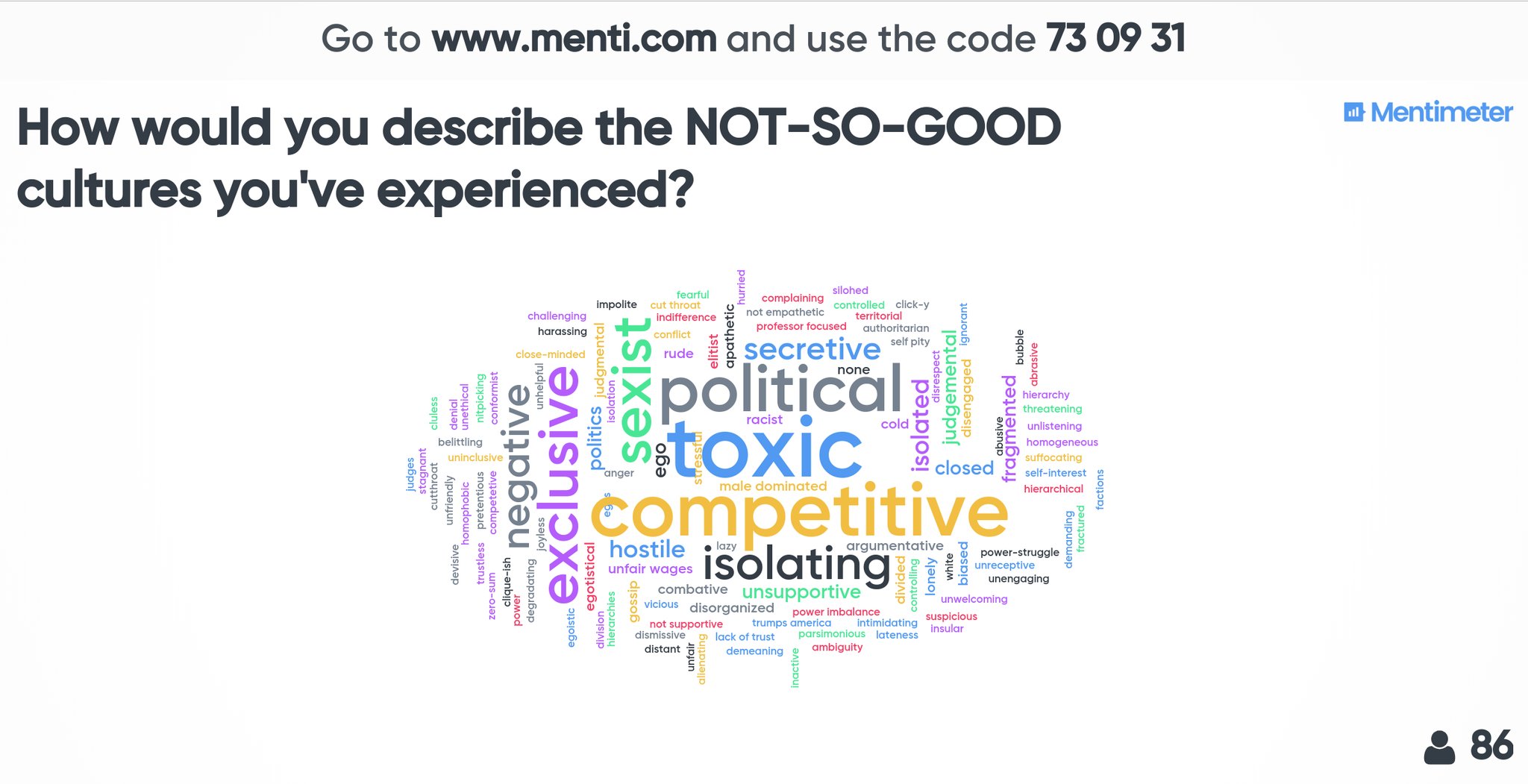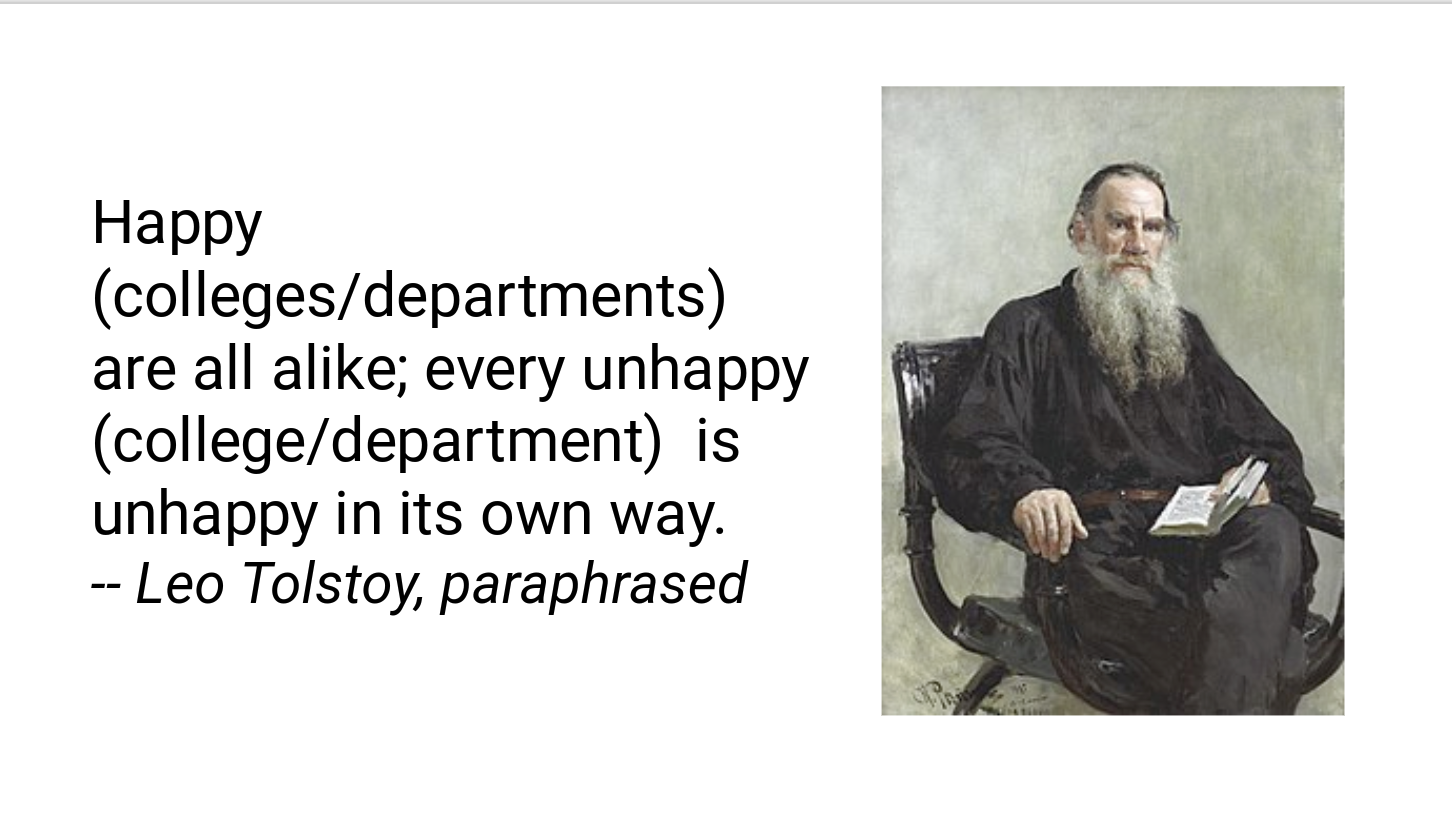Departmental culture building starts with everyone

Last month I had the opportunity to speak with the new cohort of Project NExT fellows from the Mathematical Association of America. Project NExT is a professional development program for new and recent Ph.D. recipients in the mathematical sciences, most of whom are entering the professoriate for the first time this fall, or did so last year. I'm an alumnus of Project NExT myself (from the "Peach Dot" cohort, 1997-1998) and my participation in the program over 20 years ago was instrumental in shaping the kinds of things I've done, thought about, and written about in that time, so it was a real honor and pleasure to give back.
When Dave Kung approached me about coming out to Denver to speak, he pointed to this blog post about workplace culture and asked if I could turn it into a plenary. I was very happy to do so, because throughout my career, the pivotal moments have always involved culture. And yet, I can't recall a single talk I've ever heard at a mathematics conference about the importance of departmental culture or how to contribute to building a positive, productive culture in one's department. Talking about culture is something we don't do enough, at least in a constructive and intentional way, especially for those just entering the profession.
In fact, if there's one message I've heard consistently, it's that new professors should not try to do anything with the culture in which they work – they should instead just keep their heads down, get their research and teaching done, and not make any waves until after they get tenure. But building the kind of culture in which you'd want to work for decades following tenure doesn't just "happen" – it's built, and building it is the responsibility of each person in it, not just the tenured. So in my talk, I wanted to stress that new faculty can and should get involved with building the world they want to live and work in, right away, through simple and positive contributions that make their departments more supportive and welcoming places.
Here are the slides from the talk:
One moment from the talk really taught me something, and I wanted to share it here. At one point, I mentioned that every organization has a culture – a system of beliefs, rituals, and norms that define "the way we do things around here". And since we have all been a part of organizations throughout our lives, questions about culture are not just abstract but something we live and have lived every day for a long time. I asked the NExTers to think about their experiences with a "good" culture in the past and list three words that would describe it. Here are the results:

Then I asked them to list three words that would describe a "bad" culture they've been involved with:

What struck me about these results were that people tended to describe good cultures in more or less the same way. "Supportive" was the most common word, and many of the less frequent words were synonyms. Welcoming, inclusive, and collaborative were common as well. But people used all kinds of different ways to describe bad cultures and these weren't all antonyms of "supportive": toxic, political, competitive, isolating, exclusive, negative, sexist, closed, hostile, ego, disorganized, power struggle.
I had prepared this slide as my follow-up, but I had no idea how well the polling results were going to support it:

It turns out this is true and I think the Project NExT cohort is exactly right. Good departmental (and other) working cultures are all very much alike: primarily they are places where we feel supported in doing what we are doing. In the language of Daniel Coyle's terrific book The Culture Code – which catalyzed a lot of my thinking about culture during my sabbatical and was an inspiration for my talk – good cultures all share the characteristics of vulnerability, psychological safety, and purpose. In good cultures, in other words, we are not afraid to signal when we need help (and we respond positively to others' signals), we are not scared or ashamed to take appropriate risks with our ideas, and there is a strong and shared sense of what the group stands for and believes in. One cannot help but feel immersed in support inside a culture like this.
But bad cultures are all bad in different ways. We see a microcosm of this in many college and departmental cultures. Some are ego-driven and fraught with power struggles. Some are exclusionary – and you can break down exclusivity in more than one way, by racism or sexism or in any way signaling to another that they don't belong. Some suffer, willfully or otherwise, from disorganization and a poor flow of information, which may seem trivial in the small scale but really signals a disrespect for the time and energy of others in the large. A great many bad departmental cultures experience a linear combination of these.
I work in a department with a great culture. When I travel to other places to speak, I get a front row seat for the cultures of other departments, some very different from my home department. But you can sense the quality of the culture immediately. The ones with good cultures — like the math department at the University of Hartford (where I spent a week this summer), the math faculty at Oakland Community College in Detroit (which gave me my first keynote event 6 years ago), and the cross-disciplinary faculty of the Appalachian College Association, just to name three – all made me and everyone else feel welcome and safe to explore ideas that were difficult at times, and they had a clear sense of what they were trying to accomplish as organizations and made their decisions based on those goals.
But the bad cultures? Not so much. I can tell within minutes whether the culture is bad – it's in the body language of the people in the room and the way they speak, or don't speak, to me and each other. Sometimes the egos barely fit into the room. Sometimes it's subtle or not-so-subtle exclusionary tactics. Sometimes you can tell there are power struggles going on underneath the surface. Either way, it's bad. For these, I do my spiel, but when I leave I am not hopeful that what I do, does any good. The faculty and administrators in those places are stuck with the culture they have, and no workshop or keynote is going to accomplish anything useful, until they decide that they want better for themselves and more importantly for their students,
And that, I think, is where the new faculty – the untenured faculty – come in. I think that group has far more power than they realize in terms of making positive changes to the cultures in which they work. I asked the NExTers to come up with one concrete thing they will commit to doing this fall to build a more positive workplace culture in their departments. Some of the things they mentioned included:
- Holding office hours in an open, public area like the library instead of in the office.
- Organizing a weekly hour for coffee in the department (including students).
- Reading a book together. (I suggested The Culture Code. I'm reading it right now with my department chair and fellow assistant chair, and I think it would be a great departmental read on something that isn't explicitly about teaching or mathematics.)
- Committing personally to never engaging in negative talk about someone when they aren't in the room – especially students.
- Observing the Pac-Man rule when in a group.
These aren't groundbreaking or expensive. In fact, I think in most organizations with good cultures, you'll not find anything groundbreaking in the past that got things moving in that direction but rather a consistent signal of small choices that favor openness, safety, and purpose that say, "this is how we do things around here". That can, and should, be the job of every person who wants to enjoy what they do.


